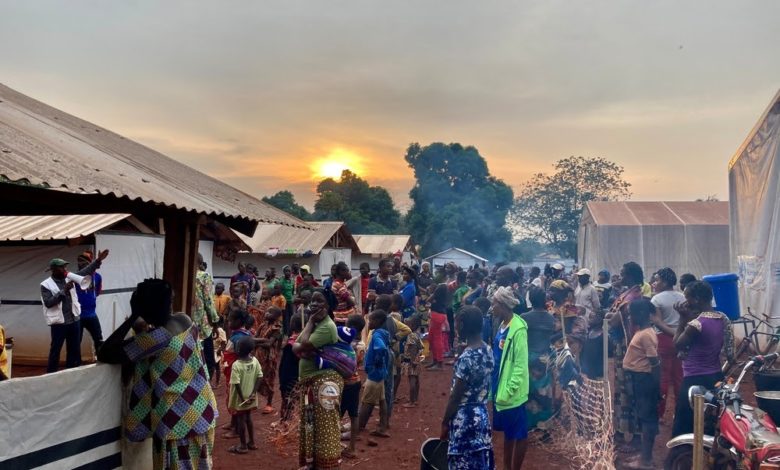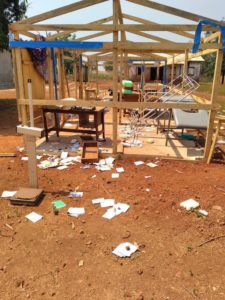Increased Attacks Force MSF To Suspend Operations In Central African Republic
With nationwide violence, MSF says it has been forced to suspend medical activities in the Central African Republic.

Continued attacks on patients, healthcare staff, and medical facilities has forced the suspension of medical activities in Central African Republic (CAR), says international charity medical organisation, Médecins Sans Frontières/Doctors Without Borders (MSF).
“The resurgence of conflict in CAR since December has taken a large toll on the civilian population and on medical care. We are devastated by the repeated attacks on patients, health workers and medical facilities,” says Rhian Gastineau MSF Head of Mission in the Central African Republic.
Since the conflict intensified in late-2020, MSF has worked to ensure continuity of care in all its projects and has launched emergency projects in the conflict-affected areas.
Over the past six months, MSF teams have witnessed health facilities looted, damaged, and occupied by armed groups. Armed attacks into hospitals have subjected patients to violence, physical abuse, interrogation, and arrest.
Community health workers in rural areas have been threatened and assaulted, while motorbike riders delivering medical drugs and transporting sick and wounded patients to hospital have been attacked, injured, and robbed at gunpoint.
In Feb. this year, fighting between government forces and non-state armed groups inside an MSF-supported health centre in Elevage camp for displaced people, near Bambari, left the building damaged after it was hit by a rocket.
In June, a nearby health post was destroyed after 8,500 displaced persons were expelled from the site, which was then burned to the ground.
Over the past six months, MSF mobile teams in Ouaka, Ouham-Pendé, and Ombella-Mpoko have witnessed multiple health facilities looted and partially destroyed, with solar panels, medical supplies, and mattresses stolen, as well as doors and windows smashed.

In Bangui and elsewhere, rebel groups have entered health facilities managed and supported by MSF to interrogate or arrest patients. In Feb., armed rebels attempted to kill a patient in the MSF-supported hospital in Bouar.
In May, near Kabo town, two community health workers trained by MSF to treat people in remote areas for common diseases such as diarrhoea, malaria, and malnutrition, were shot in the legs and head during armed robberies, while two others were too fearful to carry on working after receiving death threats.
In June, a convoy transporting patients to MSF’s hospital in Batangafo was caught in an ambush by armed men, leaving a patient’s caretaker dead and a motorbike rider and two patients injured. Two other attacks took place nearby in the same month, while similar attacks occurred near Bossangoa and Bria.
“Since December, moving around on the outskirts of major towns has been extremely difficult and dangerous due to checkpoints, robberies and attacks,” says Gisa Kohler, MSF Deputy Programme Manager.
As a result of these incidents, MSF has had to temporarily suspend its medical activities, including providing lifesaving care, supervising health centre staff, supplying drugs, and transporting patients.
“Being forced to suspend our activities only makes people vulnerable and results in the avoidable deaths of young children and women with complications in pregnancy and childbirth, among others,” Kohler said.
MSF had to reduce referrals of patients by motorbike from rural areas to Kabo and other areas in Paoua and Bria since April due to the risks involved; as a result, the number of patients referred each month has nearly halved.
“The suspension and reduction of medical outreach activities across numerous areas where we work is very concerning, now with the ongoing rainy season, when cases of malaria and life-threatening diseases are at peak.”
Sometimes, as happened in Kabo in July, just the rumour of an attack created a sudden movement of panicked people.
“Unfortunately it is not new for violence to impact medical care in CAR. The increased numbers of armed groups and the active fighting have caused a very volatile situation, and affected areas that were considered stable with a constraint to healthcare to the struggling population,” Gastineau said.
MSF urged the government and all parties to the conflict to respect health facilities and to allow people to have access to medical and humanitarian assistance.
“Now, all parties to the conflict should reinforce respect for international humanitarian law, including the protection of civilians and medical facilities, transport and staff.”
Support Our Journalism
There are millions of ordinary people affected by conflict in Africa whose stories are missing in the mainstream media. HumAngle is determined to tell those challenging and under-reported stories, hoping that the people impacted by these conflicts will find the safety and security they deserve.
To ensure that we continue to provide public service coverage, we have a small favour to ask you. We want you to be part of our journalistic endeavour by contributing a token to us.
Your donation will further promote a robust, free, and independent media.
Donate HereStay Closer To The Stories That Matter




